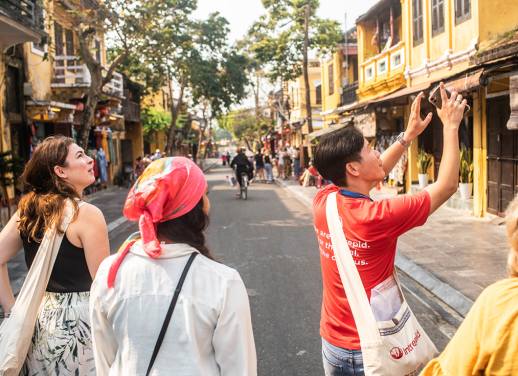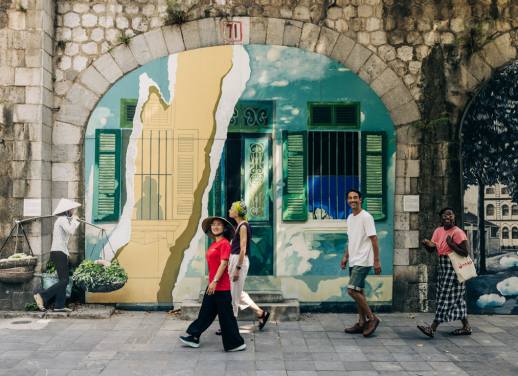Most of the time I completely forget that I’m walking around with two little microphones wrapped around my ears. Having grown up with what’s called a ‘moderate sensorineural hearing loss’, I’ve adapted to living in a way that means my impairment goes largely unnoticed.
But there are moments – little things every now and then – when I’m reminded.
It might be picking up my phone to find multiple missed calls from my girlfriend, even though it was right next to me on my desk. Tilting my head and straining to hear a friend’s voice in a quiet cafe. It’s that uneasy panic when my hearing aid starts beeping to tell me its battery is about to die. Beep-beep: you’ve only got five more minutes of good hearing left in the tank.
I’m not going to complain about being hearing impaired. It’s taught me many things – good and bad – but the most frustrating thing is how isolating it can be. I remember as a kid being too worried to order bread at a bakery in case I couldn’t hear the person at the counter. Not wanting to visit bars with my friends as I got older because I just couldn’t hear anything. Feeling embarrassed because I need to repeatedly ask ‘what?’, or apologise for not hearing something. Let’s just say I’m now the master of the smile-and-nod technique.
RELATED: TOUGH SKIN AND A SOFT HEART – WHAT BEING FEARLESS MEANS TO ONE SOLO TRAVELLER
That same anxiety was also one of the barriers to my first independent travel experience. Surely, I reasoned, if I had problems hearing what people say and was reliant on lip-reading in my own country, the problem would be far worse in a country where people almost definitely had accents and likely couldn’t communicate in English.

Cycling through Hoi An
You can imagine my concern when it came to travelling to Vietnam. A country so different from my own, in language, customs, cuisine and much more. I was preparing myself to stumble from one embarrassing encounter to the next. Sure, I was beyond excited too. I love Vietnamese food and couldn’t wait to learn more about the country. There was just that niggling doubt – what if I don’t understand someone? How am I going to make new friends if we’re in noisy bars and I can’t hear?
My worries quickly evaporated on the first day of my Vietnam Express Southbound tour, mostly thanks to the first-day excitement of everyone getting to know each other. It wasn’t long before our guide, Bac (pronounced ‘buck’), was leading us all in a toast at a nearby restaurant – mot, hai, ba, zo! He knew just the place that would have the right ambiance so I wouldn’t be left out of conversation.

Enjoying the sun in Hue
A few days later we found ourselves in Hoi An’s Central Market. We wandered past tables topped with slabs of red meat still wet from slaughter, plastic buckets brimming with spices and chillies, and shelves stuffed full of knick-knacks. I was looking for something to take home as a memento of my trip, and found a carved wooden box containing ornate black chopsticks.
SUBSCRIBE TO INTREPID’S NEWSLETTER FOR TRAVEL TIPS, COMPETITIONS, GIVEAWAYS & MORE
I turned to the stall owner, a small woman with smiling eyes and black hair tied back in a bun, and asked for the price. When she replied in broken English, I didn’t understand a word. I could feel a hot flush as I realised what was happening. I asked again but my brain just couldn’t piece together the sounds she was making into something I could understand. ‘Smile-and-nod’ wasn’t going to get me out of this one.
There was an awkward moment before I turned and looked at one of my travel buddies. She laughed, and stepped in to help us. When I couldn’t hear something that was being said, she’d repeat it for me so I could hear, almost like a translator. A few moments later I was walking away with a new set of chopsticks. Even though I apologised in embarrassment, she was good spirited enough to understand.

Checking out the view in Halong Bay
Travelling with a small group of friends meant I always had someone at my back, even if it was just for the little things like helping to order food or understanding directions. Getting to know Bac early in the trip meant I also felt comfortable approaching him quietly to ask for clarification on things I couldn’t hear when he was talking to the group – dates, times, places to see or restaurants to visit – or even repeating stories he’d told the group that I might have missed out on.

Our leader, Bac.
While having the support of the group was one thing, the actual experience of getting outside my comfort zone and talking with the locals was one of the biggest challenges. Being forced to confront something uncomfortable meant, with each local interaction, I began to feel my confidence grow. I quickly realised it wasn’t as hard as I had anticipated. Sure, there were the awkward stumbles in conversation, but we learned to laugh through it together. Now I can’t wait to get out on the open road and continue meeting new people.
5 tips for travellers with a hearing impairment
1. Learn some of the local language before you travel
Having a basic grasp of the language, and a familiarity with the sounds involved, can make it easier to understand the locals and even helps with lip reading.
2. Always pack an extra set of batteries
Hearing aids batteries might not be easy to buy in the countries you’re visiting, so save yourself the hassle of trying to find them by packing extras just in case.
3. Travel with a friend or a group
There’s safety in numbers. Travelling with a friend or group means you can always ask for help if you mishear or don’t understand something.
4. Tell your leader about your hearing impairment early on
Hearing impairments aren’t visibly obvious, so step up and tell your leader at the beginning of the tour so they’re aware of your hearing difficulties. That way they can accommodate it when providing instructions to the group, choosing restaurants to visit and leading activities.
5. Ask for written instructions
Sometimes you think you’ve understood verbal directions only to walk out the door and realise you completely misheard what you were told. Wander with peace of mind by asking your leader or hotel reception to write down brief written directions, or key times for the day (such as when to return to the bus or hotel) for you.
Get out there, challenge yourself, see the world. Browse our range of small group adventures now.
All images C/O Justin Meneguzzi




